初三英语语法大全
初三英语语法总结归纳

初三英语语法总结归纳初三英语语法总结在初三阶段的学习中,英语语法是一个非常重要的内容。
掌握英语语法可以帮助我们正确地表达思想,提高写作和口语表达的能力。
下面是初三英语语法的总结归纳。
一、时态1. 一般现在时:表示经常性、习惯性的动作和真理、客观事实等。
例如:I often go swimming on weekends.(我经常在周末去游泳。
)2. 现在进行时:表示现在正在进行的动作。
例如:She is watching TV now.(她正在看电视。
)3. 一般过去时:表示过去某个时间发生的动作和存在的状态。
例如:I visited Beijing last summer.(去年夏天我去了北京。
)4. 过去进行时:表示过去某个时间正在进行的动作。
例如:He was playing soccer at this time yesterday.(他昨天这个时候正在踢足球。
)5. 一般将来时:表示将要发生的动作或存在的状态。
例如:We will have a party tomorrow.(我们明天要开个派对。
)6. be going to + 动词原形:表示计划、打算要发生的动作。
例如:I am going to travel to Europe next year.(明年我打算去欧洲旅游。
)7. 现在完成时:表示过去发生的动作对现在的影响或结果。
例如:I have finished my homework.(我已经完成作业了。
)8. 过去完成时:表示过去某个时间或动作之前已经完成的动作。
例如:She had already left when I arrived.(我到达时她已经离开了。
)9. 将来完成时:表示将来某个时间之前已经完成的动作。
例如:By the end of this month, we will have finished the project.(到这个月底,我们将会完成这个项目。
初三(九年级)英语语法大全
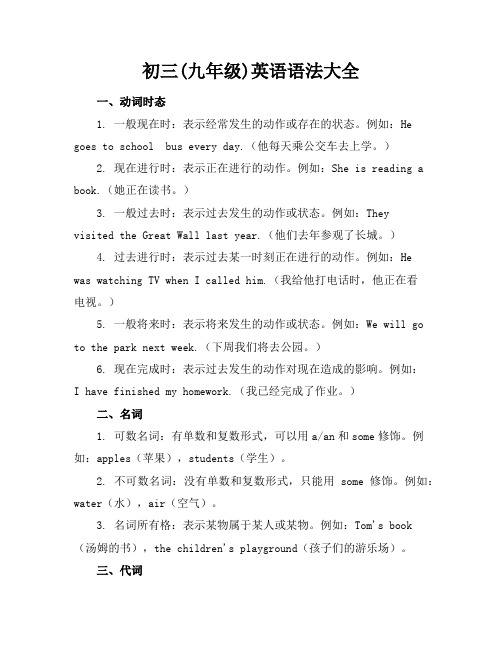
初三(九年级)英语语法大全一、动词时态1. 一般现在时:表示经常发生的动作或存在的状态。
例如:He goes to school bus every day.(他每天乘公交车去上学。
)2. 现在进行时:表示正在进行的动作。
例如:She is reading a book.(她正在读书。
)3. 一般过去时:表示过去发生的动作或状态。
例如:Theyvisited the Great Wall last year.(他们去年参观了长城。
)4. 过去进行时:表示过去某一时刻正在进行的动作。
例如:He was watching TV when I called him.(我给他打电话时,他正在看电视。
)5. 一般将来时:表示将来发生的动作或状态。
例如:We will go to the park next week.(下周我们将去公园。
)6. 现在完成时:表示过去发生的动作对现在造成的影响。
例如:I have finished my homework.(我已经完成了作业。
)二、名词1. 可数名词:有单数和复数形式,可以用a/an和some修饰。
例如:apples(苹果),students(学生)。
2. 不可数名词:没有单数和复数形式,只能用some修饰。
例如:water(水),air(空气)。
3. 名词所有格:表示某物属于某人或某物。
例如:Tom's book(汤姆的书),the children's playground(孩子们的游乐场)。
三、代词1. 人称代词:I(我),you(你/你们),he(他),she(她),it(它),we(我们),they(他们)。
2. 物主代词:my(我的),your(你的/你们的),his(他的),her(她的),its(它的),our(我们的),their(他们的)。
3. 指示代词:this(这个),that(那个),these(这些),those(那些)。
英语九年级语法知识点总结
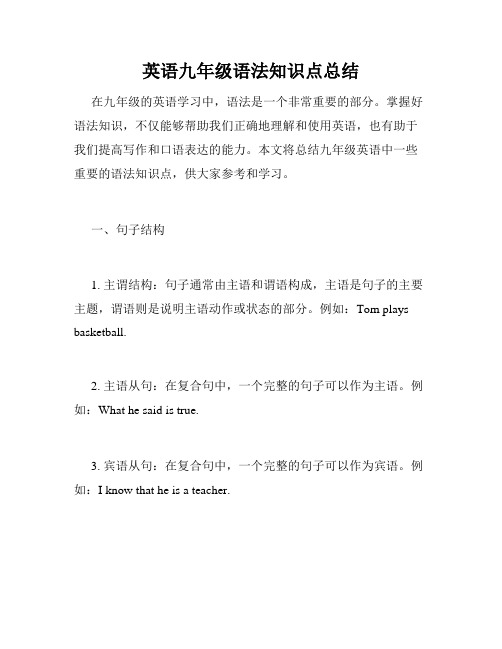
英语九年级语法知识点总结在九年级的英语学习中,语法是一个非常重要的部分。
掌握好语法知识,不仅能够帮助我们正确地理解和使用英语,也有助于我们提高写作和口语表达的能力。
本文将总结九年级英语中一些重要的语法知识点,供大家参考和学习。
一、句子结构1. 主谓结构:句子通常由主语和谓语构成,主语是句子的主要主题,谓语则是说明主语动作或状态的部分。
例如:Tom plays basketball.2. 主语从句:在复合句中,一个完整的句子可以作为主语。
例如:What he said is true.3. 宾语从句:在复合句中,一个完整的句子可以作为宾语。
例如:I know that he is a teacher.4. 定语从句:在复合句中,一个完整的句子可以作为定语来修饰名词。
例如:The book that I borrowed from the library is very interesting.5. 状语从句:在复合句中,一个完整的句子可以作为状语来修饰动词、形容词或副词。
例如:I will go swimming if the weather is good.二、时态和语态1. 一般现在时:用于描述经常性的动作、习惯或客观事实。
例如:He often plays basketball.2. 现在进行时:用于表示现在正在进行的动作。
例如:I am reading a book now.3. 一般过去时:用于描述过去发生的动作或状态。
例如:She watched a movie last night.4. 过去进行时:用于表示过去某一时刻正在进行的动作。
例如:They were playing football when it started raining.5. 将来时态:表示将来要发生的动作或状态。
例如:We will have a party next weekend.6. 被动语态:表示动作发生的对象是句子的主语。
英语九年级语法知识点
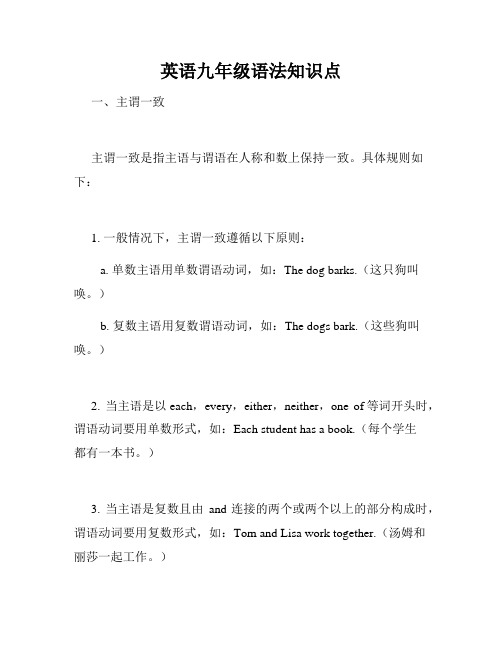
英语九年级语法知识点一、主谓一致主谓一致是指主语与谓语在人称和数上保持一致。
具体规则如下:1. 一般情况下,主谓一致遵循以下原则:a. 单数主语用单数谓语动词,如:The dog barks.(这只狗叫唤。
)b. 复数主语用复数谓语动词,如:The dogs bark.(这些狗叫唤。
)2. 当主语是以each,every,either,neither,one of等词开头时,谓语动词要用单数形式,如:Each student has a book.(每个学生都有一本书。
)3. 当主语是复数且由and连接的两个或两个以上的部分构成时,谓语动词要用复数形式,如:Tom and Lisa work together.(汤姆和丽莎一起工作。
)4. 当主语是并列名词,中间有or,nor,either...or,neither...nor连接时,谓语动词与靠近的主语保持一致,如:Neither David nor his friends are coming to the party.(大卫和他的朋友都不来参加派对。
)二、时态时态是表示动作或状态发生时间的一种语法形式。
常见的英语时态有以下几种:1. 现在时:表示当前的动作或状态。
a. 现在简单时:经常性或习惯性动作,或者现在的真理、规律等。
如:I play basketball every Sunday.(我每个星期天打篮球。
)b. 现在进行时:表示目前正在进行的动作。
如:They are watching a movie.(他们正在看电影。
)c. 现在完成时:表示过去发生但对现在产生影响的动作。
如:She has already done her homework.(她已经完成作业了。
)2. 过去时:表示过去的动作或状态。
a. 过去简单时:表示在过去某个时间发生的动作。
如:I finished my project last night.(昨晚我完成了我的项目。
九年级英语知识点归纳整理

九年级英语知识点归纳整理一、语法知识点。
1. 被动语态。
- 结构:一般现在时的被动语态:am/is/are + 过去分词;一般过去时的被动语态:was/were+过去分词;一般将来时的被动语态:will be+过去分词;含有情态动词的被动语态:情态动词+be +过去分词。
- 用法:当不知道动作的执行者是谁,或者没有必要指出动作的执行者时,使用被动语态。
例如:The bridge was built last year.(不知道谁建的桥,只强调桥被建好了)2. 定语从句。
- 关系代词:that,which,who,whom,whose。
that既可以指人也可以指物;which指物;who指人,在从句中作主语;whom指人,在从句中作宾语;whose表示所属关系,“……的”。
例如:I like the book which/that was written by Lu Xun.(先行词book是物,关系代词可用which或that);The boy who/that is standing there is my brother.(先行词boy是人,关系代词可用who或that作主语)- 关系副词:when,where,why。
when在定语从句中作时间状语;where作地点状语;why作原因状语。
例如:I still remember the day when I first met her.(先行词day表示时间,关系副词用when);This is the place where we used to live.(先行词place表示地点,关系副词用where)3. 宾语从句。
- 语序:宾语从句要用陈述句语序,即“连接词+主语+谓语+其他”。
例如:He asked me where I was going.而不是He asked me where was I going.- 连接词:that(无意义,可省略,在从句中不作成分);if/whether(“是否”,在从句中不作成分);特殊疑问词(如what,when,where,why,how等,在从句中作相应的成分)。
九年级英语语法知识点整理归纳
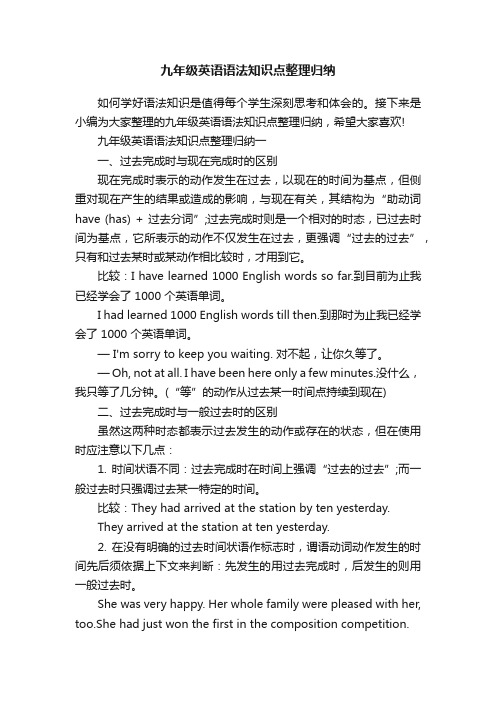
九年级英语语法知识点整理归纳如何学好语法知识是值得每个学生深刻思考和体会的。
接下来是小编为大家整理的九年级英语语法知识点整理归纳,希望大家喜欢!九年级英语语法知识点整理归纳一一、过去完成时与现在完成时的区别现在完成时表示的动作发生在过去,以现在的时间为基点,但侧重对现在产生的结果或造成的影响,与现在有关,其结构为“助动词have (has) + 过去分词”;过去完成时则是一个相对的时态,已过去时间为基点,它所表示的动作不仅发生在过去,更强调“过去的过去”,只有和过去某时或某动作相比较时,才用到它。
比较:I have learned 1000 English words so far.到目前为止我已经学会了 1000 个英语单词。
I had learned 1000 English words till then.到那时为止我已经学会了 1000 个英语单词。
— I'm sorry to keep you waiting. 对不起,让你久等了。
— Oh, not at all. I have been here only a few minutes.没什么,我只等了几分钟。
(“等”的动作从过去某一时间点持续到现在)二、过去完成时与一般过去时的区别虽然这两种时态都表示过去发生的动作或存在的状态,但在使用时应注意以下几点:1. 时间状语不同:过去完成时在时间上强调“过去的过去”;而一般过去时只强调过去某一特定的时间。
比较:They had arrived at the station by ten yesterday.They arrived at the station at ten yesterday.2. 在没有明确的过去时间状语作标志时,谓语动词动作发生的时间先后须依据上下文来判断:先发生的用过去完成时,后发生的则用一般过去时。
She was very happy. Her whole family were pleased with her, too.She had just won the first in the composition competition.3. 当两个或两个以上接连发生的动作用 and 或 but 连接时,按时间顺序,只需用一般过去时来代替过去完成时;另外,在before ,after ,as soon as 引导的从句中,由于这些连词本身已经表示出时间的先后,因此也可以用过去时来代替过去完成时。
初中三年英语语法知识归纳最全的中考英语语法大全汇总
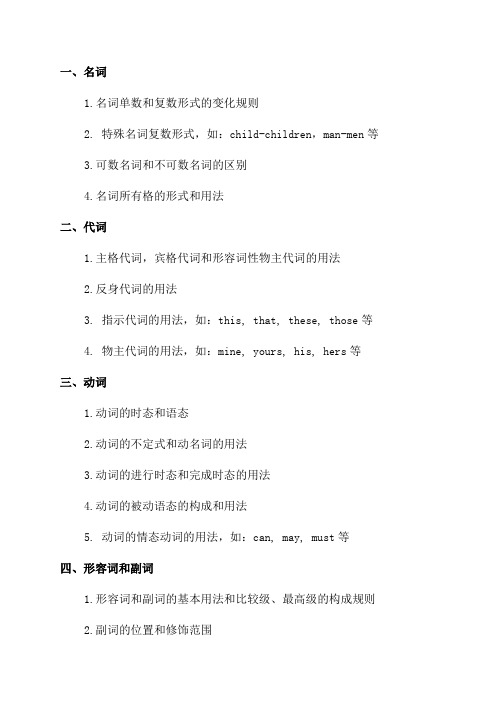
一、名词1.名词单数和复数形式的变化规则2. 特殊名词复数形式,如:child-children,man-men等3.可数名词和不可数名词的区别4.名词所有格的形式和用法二、代词1.主格代词,宾格代词和形容词性物主代词的用法2.反身代词的用法3. 指示代词的用法,如:this, that, these, those等4. 物主代词的用法,如:mine, yours, his, hers等三、动词1.动词的时态和语态2.动词的不定式和动名词的用法3.动词的进行时态和完成时态的用法4.动词的被动语态的构成和用法5. 动词的情态动词的用法,如:can, may, must等四、形容词和副词1.形容词和副词的基本用法和比较级、最高级的构成规则2.副词的位置和修饰范围3. 常见的形容词和副词的用法,如:good, well, bad, badly等五、冠词和介词1.不定冠词和定冠词的用法2.冠词与名词的搭配3.介词的基本用法和常见的介词短语4.常见的介词短语的固定搭配和习惯用法六、从句和状语从句1.定语从句和名词性从句的引导词和用法2.时间状语从句、条件状语从句和目的状语从句的引导词和用法3.原因状语从句和结果状语从句的引导词和用法七、倒装和虚拟语气1.部分倒装和完全倒装的情况和用法2.虚拟语气的用法,包括虚拟条件句和虚拟语气在主句中的表达方式八、陈述句、疑问句和祈使句1.简单陈述句和陈述句的否定形式2.一般疑问句和特殊疑问句的句型和用法3.祈使句的用法和变化形式以上只是初中英语语法知识的一部分,还有许多其他的语法知识点,如条件句、比较结构、间接引语等。
如果你需要进一步的复习材料,可以查阅相关的英语语法书籍或教材,或者向老师寻求帮助。
初三的英语语法知识点大全

初三的英语语法知识点大全(经典版)编制人:__________________审核人:__________________审批人:__________________编制单位:__________________编制时间:____年____月____日序言下载提示:该文档是本店铺精心编制而成的,希望大家下载后,能够帮助大家解决实际问题。
文档下载后可定制修改,请根据实际需要进行调整和使用,谢谢!并且,本店铺为大家提供各种类型的经典范文,如演讲稿、总结报告、合同协议、方案大全、工作计划、学习计划、条据书信、致辞讲话、教学资料、作文大全、其他范文等等,想了解不同范文格式和写法,敬请关注!Download tips: This document is carefully compiled by this editor. I hope that after you download it, it can help you solve practical problems. The document can be customized and modified after downloading, please adjust and use it according to actual needs, thank you!In addition, this shop provides you with various types of classic sample essays, such as speech drafts, summary reports, contract agreements, project plans, work plans, study plans, letter letters, speeches, teaching materials, essays, other sample essays, etc. Want to know the format and writing of different sample essays, so stay tuned!初三的英语语法知识点大全许多英语学习者在实践中积累了丰富的经验,探讨了很多有效的方法。
初三英语语法基础知识大全

初三英语语法基础知识大全1.初三英语语法基础知识大全篇一动名词(doing)动名词相当于名词,在句子中可以做主语、宾语、表语、定语等。
1. 作主语Fighting broke out between the South and the North.南方与北方开战了。
2. 作宾语Would you mind turning down your radio a little, please?请问你介意调小一点收音机的音量吗?3. 作表语Babysister’s job is washing,cooking and taking care of the children.保姆的工作是洗衣服,作饭和照看孩子。
neither与nor的用法1.如前句是否定式从句,则主句用neither,而不用nor.If you don't do it,neither should I.如果你不干,我也不干.2.如后连续有几个否定句式,则用nor,不用neither.He can't sing,nor dance,nor skate.2.初三英语语法基础知识大全篇二连词及其用法1.连词是一种虚词,它不能独立担任句子成分而只起连接词与词,短语与短语以及句与句的作用。
2.常见的连词and(和,与;而且;于是,然后;因此)but(但是;通常用not...but...不是...而是...;可是,然而;表示惊讶,不同意等--喔,哇;用来加强语句重复部分的语气--一定;用来引入新话题--那就;常用于否定句--而不,若不;用于含doubt,question等字的否定句中相当于that--对于)or(或者,还是;用于否定句或问句--也不;否则,要不然;也就是说,换言之)nor(用在neither之后--也不;用在no,not,never之后--也不;用在句首,句子需倒装--也不)so(因此,所以;因而,从而)yet(可是,却,然而)for(因为,由于)both…and(既...又...;不但...而且)not only…but also(不但,而且)either…or(不是...就是;要么...要么)neither…nor(既不...也不...)3.并列连词:①and 与or;②both …and两者都;③not only…but ...as well as=not only...but also不但…而且;④neither…nor意思为"既不……也不……"谓语动词采用就近原则,与nor后的词保持一致。
初中三年英语语法知识归纳最全的中考英语语法大全汇总

一.句子结构及句型1.简单句:由一个主语和一个谓语组成的句子。
2.并列句:由两个或多个相互独立的简单句连接而成的句子。
3.复合句:由一个主句和一个或多个从句连接而成的句子。
4.疑问句:用来提问的句子,常以助动词、系动词或情态动词开头。
5.祈使句:用来表示命令、请求、建议等的句子。
6.感叹句:表示强烈的感情、情绪或意义的句子。
二.时态的用法1.一般现在时:表示经常性或客观事实。
2.一般过去时:表示过去一些时间发生的动作或状态。
3.现在进行时:表示现在进行或暂时的动作。
4.过去进行时:表示过去时进行或暂时的动作。
5.将来时:表示将来要发生的动作或存在的状态。
三.语态的用法1.一般现在时的被动语态:主语是动作的承受者。
2.一般过去时的被动语态:主语是动作的承受者。
3.现在进行时的被动语态:主语是动作的承受者。
4.过去进行时的被动语态:主语是动作的承受者。
四.动词的用法1.及物动词:必须接宾语才能构成完整的意思。
2.不及物动词:不需要接宾语就能构成完整的意思。
3.能愿动词:包括情态动词和行为动词,用于表示能力、愿望、可能性等。
五.名词的用法1.可数名词:表示可以数的事物或物体。
2.不可数名词:表示不可数的抽象概念、物质或一类事物。
3.可数名词的数量表示:使用具体数字、数词、不定代词等。
六.代词的用法1.主格代词:在句子中作主语或表语。
2.宾格代词:在句子中作宾语或介词宾语。
3.物主代词:表示所有关系,用来修饰名词。
4.反身代词:表示动作反映到自己身上。
七.形容词的用法1.表示性质或特征的词汇。
2.修饰名词或代词。
3.用比较级和最高级表示程度或比较。
八.副词的用法1.表示时间、地点、方式、程度等。
2.修饰动词、形容词、副词和句子。
九.介词的用法1.表示时间、地点、方式不同的介词。
2.用于修饰名词或代词。
十.连词的用法1. 并列连词:连接两个并列的分句,如and, but, or等。
2. 从属连词:连接主句和从句,如when, because, if等。
英语九年级全一册语法.doc
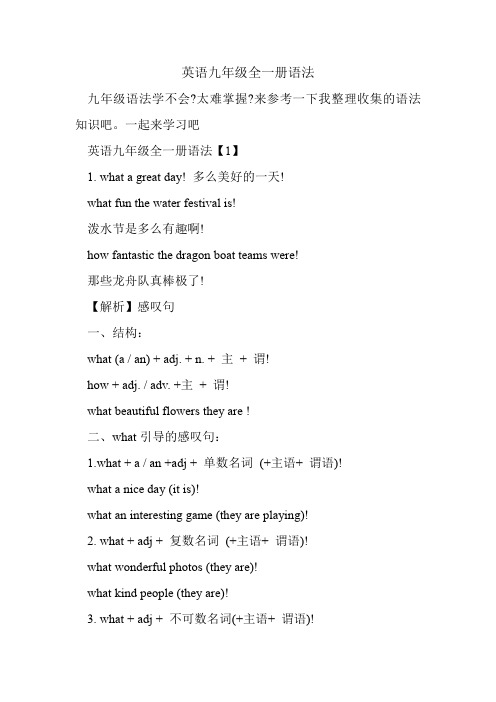
英语九年级全一册语法九年级语法学不会?太难掌握?来参考一下我整理收集的语法知识吧。
一起来学习吧英语九年级全一册语法【1】1. what a great day! 多么美好的一天!what fun the water festival is!泼水节是多么有趣啊!how fantastic the dragon boat teams were!那些龙舟队真棒极了!【解析】感叹句一、结构:what (a / an) + adj. + n. + 主+ 谓!how + adj. / adv. +主+ 谓!what beautiful flowers they are !二、what引导的感叹句:1.what + a / an +adj + 单数名词(+主语+ 谓语)!what a nice day (it is)!what an interesting game (they are playing)!2. what + adj + 复数名词(+主语+ 谓语)!what wonderful photos (they are)!what kind people (they are)!3. what + adj + 不可数名词(+主语+ 谓语)!_______ bad weather (it is)!what nice food (he cooks)!三、how引导的感叹句:1.how + adj / adv + 主语+ 谓语!how nice he is!how beautiful the flowers are!2.how + adj + a / an + 单数名词(+主语+ 谓语)!how tall a boy (he is )!how nice a song (she is singing)!3.how + adj / adv + the + 名词+ 谓语!how tall the boy is!how fine the day is!4、what 与how引导的感叹句之间的转换:1.what a beautiful girl she is != ______ beautiful the girl is !2.how delicious the food is != ______ delicious food it is !2.the dragon boat festival in hong kong 香港龙舟节【解析】介词in表地点in用于较大的地点前,如大城市、国家、洲等。
初三英语语法知识点
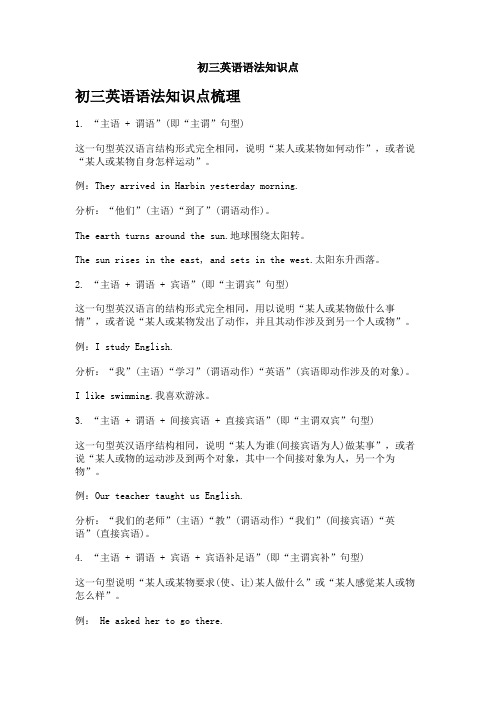
初三英语语法知识点初三英语语法知识点梳理1. “主语 + 谓语”(即“主谓”句型)这一句型英汉语言结构形式完全相同,说明“某人或某物如何动作”,或者说“某人或某物自身怎样运动”。
例:They arrived in Harbin yesterday morning.分析:“他们”(主语)“到了”(谓语动作)。
The earth turns around the sun.地球围绕太阳转。
The sun rises in the east, and sets in the west.太阳东升西落。
2. “主语 + 谓语 + 宾语”(即“主谓宾”句型)这一句型英汉语言的结构形式完全相同,用以说明“某人或某物做什么事情”,或者说“某人或某物发出了动作,并且其动作涉及到另一个人或物”。
例:I study English.分析:“我”(主语)“学习”(谓语动作)“英语”(宾语即动作涉及的对象)。
I like swimming.我喜欢游泳。
3. “主语 + 谓语 + 间接宾语 + 直接宾语”(即“主谓双宾”句型)这一句型英汉语序结构相同,说明“某人为谁(间接宾语为人)做某事”,或者说“某人或物的运动涉及到两个对象,其中一个间接对象为人,另一个为物”。
例:Our teacher taught us English.分析:“我们的老师”(主语)“教”(谓语动作)“我们”(间接宾语)“英语”(直接宾语)。
4. “主语 + 谓语 + 宾语 + 宾语补足语”(即“主谓宾补”句型)这一句型说明“某人或某物要求(使、让)某人做什么”或“某人感觉某人或物怎么样”。
例: He asked her to go there.分析:“他”(主语)“要求”(谓语动作)“她”(宾语即动作涉及的对象)“去那里”(补语—补充说明宾语应做什么)。
5. “主语 + have + 宾语”(即“拥有”句型)这一句型主要用于说明“某人或某物拥有什么(宾语,即有形或无形的资源)”。
最新九年级英语语法知识点总结大全
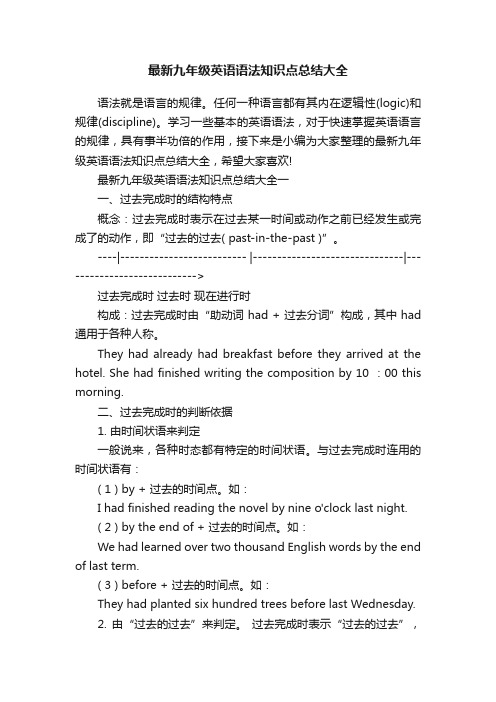
最新九年级英语语法知识点总结大全语法就是语言的规律。
任何一种语言都有其内在逻辑性(logic)和规律(discipline)。
学习一些基本的英语语法,对于快速掌握英语语言的规律,具有事半功倍的作用,接下来是小编为大家整理的最新九年级英语语法知识点总结大全,希望大家喜欢!最新九年级英语语法知识点总结大全一一、过去完成时的结构特点概念:过去完成时表示在过去某一时间或动作之前已经发生或完成了的动作,即“过去的过去( past-in-the-past )”。
----|-------------------------- |-------------------------------|---------------------------->过去完成时过去时现在进行时构成:过去完成时由“助动词 had + 过去分词”构成,其中 had 通用于各种人称。
They had already had breakfast before they arrived at the hotel. She had finished writing the composition by 10 :00 this morning.二、过去完成时的判断依据1. 由时间状语来判定一般说来,各种时态都有特定的时间状语。
与过去完成时连用的时间状语有:( 1 ) by + 过去的时间点。
如:I had finished reading the novel by nine o'clock last night.( 2 ) by the end of + 过去的时间点。
如:We had learned over two thousand English words by the end of last term.( 3 ) before + 过去的时间点。
如:They had planted six hundred trees before last Wednesday.2. 由“过去的过去”来判定。
九年级英语重点知识点总结

九年级英语重点知识点总结一、语法知识点1. 被动语态- (1)构成:一般现在时的被动语态:am/is/are+过去分词;一般过去时的被动语态:was/were+过去分词;一般将来时的被动语态:will be+过去分词;含有情态动词的被动语态:情态动词+be+过去分词。
- (2)用法:强调动作的承受者。
例如:The bridge was built last year.(这座桥是去年建造的。
)2. 定语从句- (1)关系代词:who(先行词指人,在从句中作主语或宾语),whom(先行词指人,在从句中作宾语),which(先行词指物,在从句中作主语或宾语),that(先行词指人或物,在从句中作主语或宾语)。
例如:I like the bookwhich/that was written by Lu Xun.(我喜欢鲁迅写的那本书。
)- (2)关系副词:when(先行词表示时间,在从句中作时间状语),where (先行词表示地点,在从句中作地点状语),why(先行词为reason,在从句中作原因状语)。
例如:I still remember the day when we first met.(我仍然记得我们第一次见面的那一天。
)3. 宾语从句- (1)语序:宾语从句要用陈述句语序。
例如:He asked me where I was from.(他问我来自哪里。
)- (2)时态:主现从不限;主过从必过;客观真理用一般现在时。
例如:She says that she will go to Beijing tomorrow.(她说她明天将去北京。
);He said that he had seen the movie.(他说他已经看过这部电影了。
);The teacher told us that the earth goes around the sun.(老师告诉我们地球绕着太阳转。
)4. 情态动词- (1)must:表示必须,肯定推测(用于肯定句,意为“一定”)。
九年级英语语法知识点汇总
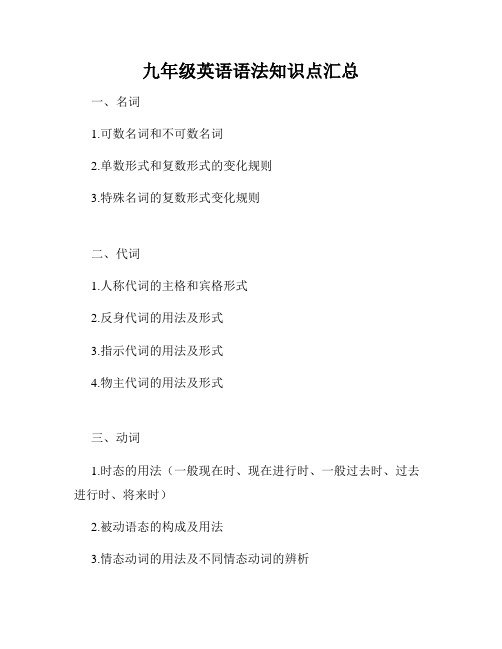
九年级英语语法知识点汇总
一、名词
1.可数名词和不可数名词
2.单数形式和复数形式的变化规则
3.特殊名词的复数形式变化规则
二、代词
1.人称代词的主格和宾格形式
2.反身代词的用法及形式
3.指示代词的用法及形式
4.物主代词的用法及形式
三、动词
1.时态的用法(一般现在时、现在进行时、一般过去时、过去进行时、将来时)
2.被动语态的构成及用法
3.情态动词的用法及不同情态动词的辨析
四、形容词和副词
1.形容词的基本用法及比较级和最高级的构成
2.副词的基本用法及比较级和最高级的构成
3.形容词和副词的位置
五、介词和介词短语
1.常用介词的用法及常见短语的搭配
2.介词短语的位置和作用
六、连词和并列句
1.连词的分类和用法(并列连词、从属连词、对等连词)
2.并列句的构成及注意事项
七、从句和复合句
1.名词性从句的种类和用法(主语从句、宾语从句、表语从句)
2.定语从句的构成及引导词的使用
3.状语从句的分类及引导词的使用
八、倒装句和间接引语
1.完全倒装句和部分倒装句的构成及使用场景
2.直接引语和间接引语的转换
九、复习与补充
1.重点复习前面九个年级所学的语法知识点
2.补充其他有关九年级英语语法的知识
以上是九年级英语语法知识点的汇总,希望能帮助到你对这些知识点的理解和掌握。
在学习过程中,请多做练习和总结,以提高自己的语法能力。
祝你学习顺利!。
初三英语语法知识点总结归纳
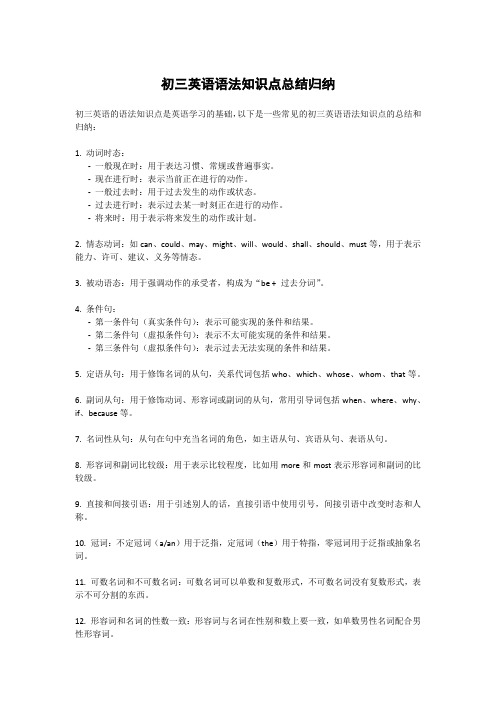
初三英语语法知识点总结归纳初三英语的语法知识点是英语学习的基础,以下是一些常见的初三英语语法知识点的总结和归纳:1. 动词时态:-一般现在时:用于表达习惯、常规或普遍事实。
-现在进行时:表示当前正在进行的动作。
-一般过去时:用于过去发生的动作或状态。
-过去进行时:表示过去某一时刻正在进行的动作。
-将来时:用于表示将来发生的动作或计划。
2. 情态动词:如can、could、may、might、will、would、shall、should、must等,用于表示能力、许可、建议、义务等情态。
3. 被动语态:用于强调动作的承受者,构成为“be + 过去分词”。
4. 条件句:-第一条件句(真实条件句):表示可能实现的条件和结果。
-第二条件句(虚拟条件句):表示不太可能实现的条件和结果。
-第三条件句(虚拟条件句):表示过去无法实现的条件和结果。
5. 定语从句:用于修饰名词的从句,关系代词包括who、which、whose、whom、that等。
6. 副词从句:用于修饰动词、形容词或副词的从句,常用引导词包括when、where、why、if、because等。
7. 名词性从句:从句在句中充当名词的角色,如主语从句、宾语从句、表语从句。
8. 形容词和副词比较级:用于表示比较程度,比如用more和most表示形容词和副词的比较级。
9. 直接和间接引语:用于引述别人的话,直接引语中使用引号,间接引语中改变时态和人称。
10. 冠词:不定冠词(a/an)用于泛指,定冠词(the)用于特指,零冠词用于泛指或抽象名词。
11. 可数名词和不可数名词:可数名词可以单数和复数形式,不可数名词没有复数形式,表示不可分割的东西。
12. 形容词和名词的性数一致:形容词与名词在性别和数上要一致,如单数男性名词配合男性形容词。
13. 反身代词:用于表示某人做某事而影响到自己的代词,如myself、yourself、himself、herself、itself、ourselves、yourselves、themselves。
九年级英语十大必考语法点
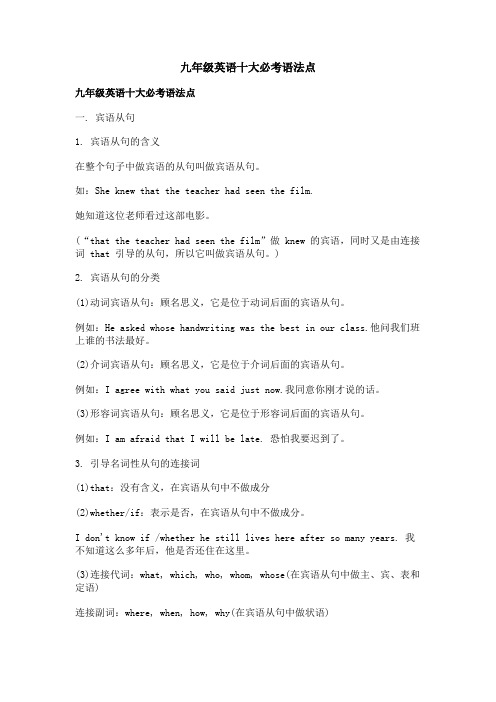
九年级英语十大必考语法点九年级英语十大必考语法点一. 宾语从句1. 宾语从句的含义在整个句子中做宾语的从句叫做宾语从句。
如:She knew that the teacher had seen the film.她知道这位老师看过这部电影。
(“that the teacher had seen the film”做 knew 的宾语,同时又是由连接词 that 引导的从句,所以它叫做宾语从句。
)2. 宾语从句的分类(1)动词宾语从句:顾名思义,它是位于动词后面的宾语从句。
例如:He asked whose handwriting was the best in our class.他问我们班上谁的书法最好。
(2)介词宾语从句:顾名思义,它是位于介词后面的宾语从句。
例如:I agree with what you said just now.我同意你刚才说的话。
(3)形容词宾语从句:顾名思义,它是位于形容词后面的宾语从句。
例如:I am afraid that I will be late. 恐怕我要迟到了。
3. 引导名词性从句的连接词(1)that:没有含义,在宾语从句中不做成分(2)whether/if:表示是否,在宾语从句中不做成分。
I don't know if /whether he still lives here after so many years. 我不知道这么多年后,他是否还住在这里。
(3)连接代词:what, which, who, whom, whose(在宾语从句中做主、宾、表和定语)连接副词:where, when, how, why(在宾语从句中做状语)The small children don't know what is in their stockings.(what 在宾语从句中做主语)这些小孩子不知道什么在他们的长筒袜里。
Could you tell me why you were late for the meeting this morning?(why 在宾语从句中做原因状语)你能告诉我为什么你今天早上开会迟到吗?4. 在做宾语从句的题目时应注意两点(1)时态①当主句是现在时态时,宾语从句可以根据需要使用任何时态。
2023最新-初三英语语法知识点总结归纳(优秀8篇)
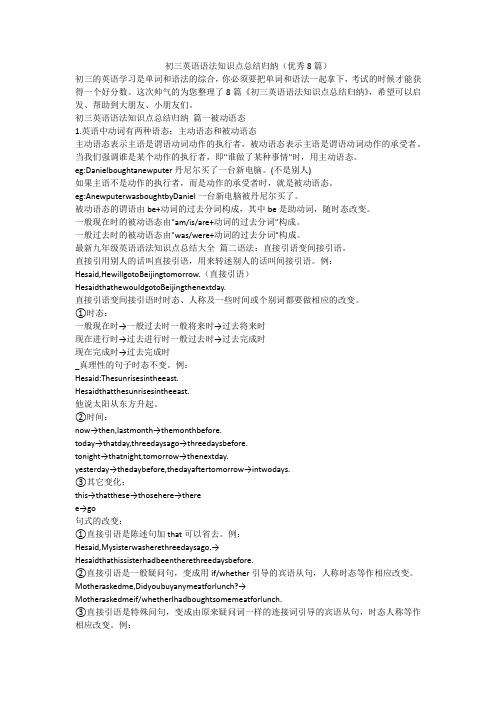
初三英语语法知识点总结归纳(优秀8篇)初三的英语学习是单词和语法的综合,你必须要把单词和语法一起拿下,考试的时候才能获得一个好分数。
这次帅气的为您整理了8篇《初三英语语法知识点总结归纳》,希望可以启发、帮助到大朋友、小朋友们。
初三英语语法知识点总结归纳篇一被动语态1.英语中动词有两种语态:主动语态和被动语态主动语态表示主语是谓语动词动作的执行者,被动语态表示主语是谓语动词动作的承受者。
当我们强调谁是某个动作的执行者,即"谁做了某种事情"时,用主动语态。
eg:Danielboughtanewputer丹尼尔买了一台新电脑。
(不是别人)如果主语不是动作的执行者,而是动作的承受者时,就是被动语态。
eg:AnewputerwasboughtbyDaniel一台新电脑被丹尼尔买了。
被动语态的谓语由be+动词的过去分词构成,其中be是助动词,随时态改变。
一般现在时的被动语态由"am/is/are+动词的过去分词"构成。
一般过去时的被动语态由"was/were+动词的过去分词"构成。
最新九年级英语语法知识点总结大全篇二语法:直接引语变间接引语。
直接引用别人的话叫直接引语,用来转述别人的话叫间接引语。
例:Hesaid,HewillgotoBeijingtomorrow.(直接引语)HesaidthathewouldgotoBeijingthenextday.直接引语变间接引语时时态、人称及一些时间或个别词都要做相应的改变。
①时态:一般现在时→一般过去时一般将来时→过去将来时现在进行时→过去进行时一般过去时→过去完成时现在完成时→过去完成时_真理性的句子时态不变。
例:Hesaid:Thesunrisesintheeast.Hesaidthatthesunrisesintheeast.他说太阳从东方升起。
②时间:now→then,lastmonth→themonthbefore.today→thatday,threedaysago→threedaysbefore.tonight→thatnight,tomorrow→thenextday.yesterday→thedaybefore,thedayaftertomorrow→intwodays.③其它变化:this→thatthese→thosehere→theree→go句式的改变:①直接引语是陈述句加that可以省去。
初三的英语语法知识点

初三的英语语法知识点初三是初中英语学习的关键阶段,语法知识的掌握对于提升英语综合能力至关重要。
以下是初三英语中一些重要的语法知识点。
一、时态1、现在完成时现在完成时表示过去发生的动作对现在造成的影响或结果,或者从过去开始一直持续到现在的动作或状态。
其构成是“have/has +过去分词”。
例如:“I have seen this film before”(我以前看过这部电影。
)“He has lived here for ten years”(他在这里住了十年了。
)2、过去完成时过去完成时表示过去某个时间或动作之前已经发生或完成的动作,即“过去的过去”。
它的构成是“had +过去分词”。
比如:“By the time I got to the station, the train had left”(我到车站的时候,火车已经开走了。
)3、过去将来时过去将来时表示从过去的某一时间来看将来要发生的动作或存在的状态。
其构成是“would +动词原形”或者“was/were going to +动词原形”。
例如:“She said she would come to see me the next day”(她说她第二天会来看我。
)二、被动语态被动语态在初三英语中也是一个重点。
一般现在时的被动语态是“am/is/are +过去分词”,一般过去时的被动语态是“was/were +过去分词”,一般将来时的被动语态是“will be +过去分词”或“be going to be+过去分词”,现在完成时的被动语态是“have/has been +过去分词”。
例如:“This book is read by many people”(这本书被很多人读。
)“The bridg e was built last year”(这座桥是去年建的。
)三、宾语从句宾语从句在句子中作宾语,通常由 that(可省略)、if/whether(是否)、连接代词(what, who, whom, whose, which)、连接副词(when, where, why, how)引导。
初三英语语法总结大全
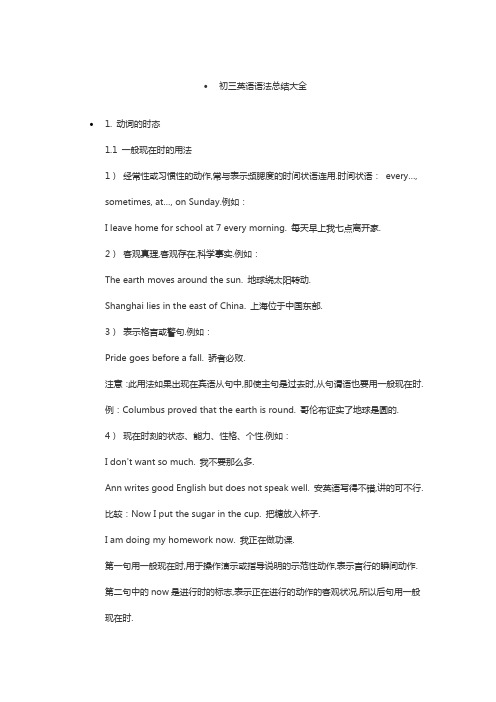
•初三英语语法总结大全• 1. 动词的时态1.1 一般现在时的用法1)经常性或习惯性的动作,常与表示频腮度的时间状语连用.时间状语:every…, sometimes, at…, on Sunday.例如:I leave home for school at 7 every morning. 每天早上我七点离开家.2)客观真理,客观存在,科学事实.例如:The earth moves around the sun. 地球绕太阳转动.Shanghai lies in the east of China. 上海位于中国东部.3)表示格言或警句.例如:Pride goes before a fall. 骄者必败.注意:此用法如果出现在宾语从句中,即使主句是过去时,从句谓语也要用一般现在时.例:Columbus proved that the earth is round. 哥伦布证实了地球是圆的.4)现在时刻的状态、能力、性格、个性.例如:I don't want so much. 我不要那么多.Ann writes good English but does not speak well. 安英语写得不错,讲的可不行.比较:Now I put the sugar in the cup. 把糖放入杯子.I am doing my homework now. 我正在做功课.第一句用一般现在时,用于操作演示或指导说明的示范性动作,表示言行的瞬间动作.第二句中的now是进行时的标志,表示正在进行的动作的客观状况,所以后句用一般现在时.返回动词的时态目录1.2 一般过去时的用法1)在确定的过去时间里所发生的动作或存在的状态.例如:时间状语有:yesterday, last week, an hour ago, the other day, in 1982等.例如:Where did you go just now? 刚才你上哪儿去了?2)表示在过去一段时间内,经常性或习惯性的动作.例如:When I was a child, I often played football in the street. 我是个孩子的时候,常在马路上踢足球.Whenever the Browns went during their visit, they were given a warm welcome.那时,布朗一家无论什么时候去,都受到热烈欢迎.3)句型:It is time for sb. to do sth "到……时间了" "该……了".例如:It is time for you to go to bed. 你该睡觉了.It is time that sb. did sth. "时间已迟了" "早该……了" ,例如It is time you went to bed. 你早该睡觉了.would (had)rather sb. did sth. 表示'宁愿某人做某事'.例如:I'd rather you came tomorrow.还是明天来吧.4)wish, wonder, think, hope 等用过去时,作试探性的询问、请求、建议等,而一般过去时表示的动作或状态都已成为过去,现已不复存在.例如:I thought you might have some. 我以为你想要一些.比较:Christine was an invalid all her life.(含义:她已不在人间.)Christine has been an invalid all her life.(含义:她现在还活着)Mrs. Darby lived in Kentucky for seven years. (含义:达比太太已不再住在肯塔基州.)Mrs. Darby has lived in Kentucky for seven years. (含义:现在还住在肯塔基州,有可能指刚离去)注意:用过去时表示现在,表示委婉语气.1)动词want, hope, wonder, think, intend 等.例如:Did you want anything else? 您还要些什么吗?I wondered if you could help me. 能不能帮我一下.2)情态动词could, would.例如:Could you lend me your bike? 你的自行车,能借用一些吗?返回动词的时态目录1.3 used to / be used toused to + do:"过去常常"表示过去习惯性的动作或状态,但如今已不存在.例如:Mother used not to be so forgetful. 老妈过去没那么健忘.Scarf used to take a walk. 斯卡夫过去常常散步.be used to + doing:对……已感到习惯,或"习惯于",to是介词,后需加名词或动名词.例如:He is used to a vegetarian diet.Scarf is used to taking a walk. 斯卡夫现在已习惯于散步了.典型例题---- Your phone number again? I ___ quite catch it.---- It's 69568442.A. didn'tB. couldn'tC. don'tD. can't答案A. 本句虽没有明确的时间状语,但从语意上看出,在听的时候没有听懂这个动作发生在过去,因此应用过去时.返回动词的时态目录1.4 一般将来时1)shall用于第一人称,常被will 所代替.will 在陈述句中用于各人称,在征求意见时常用于第二人称.例如:Which paragraph shall I read first? 我先读哪一段呢?Will you be at home at seven this evening? 今晚七点回家好吗?2)be going to +不定式,表示将来.a. 主语的意图,即将做某事.例如:What are you going to do tomorrow? 明天打算作什么呢?b. 计划,安排要发生的事.例如:The play is going to be produced next month.这出戏下月开播.c. 有迹象要发生的事.例如:Look at the dark clouds, there is going to be a storm. 看那乌云,快要下雨了.3)be +不定式表将来,按计划或正式安排将发生的事.例如:We are to discuss the report next Saturday.我们下星期六讨论这份报告.4)be about to +不定式,意为马上做某事.例如:He is about to leave for Beijing. 他马上要去北京.注意:be about to do 不能与tomorrow, next week 等表示明确将来时的时间状语连用.返回动词的时态目录1.5 be going to / will 用于条件句时,be going to表将来,will表意愿.例如:If you are going to make a journey, you'd better get ready for it as soon as possible.Now if you will take off your clothes, we will fit the new clothes on you in front of the mirror.返回动词的时态目录1.6 be to和be going tobe to 表示客观安排或受人指示而做某事,be going to 表示主观的打算或计划.例如:I am to play football tomorrow afternoon. 明天下午我去踢球.(客观安排)I'm going to play football tomorrow afternoon. 明天下午我想去踢球.(主观安排)返回动词的时态目录1.7 一般现在时表将来1)下列动词come, go, arrive, leave, start, begin, return的一般现在时可以表示将来,主要用来表示在时间上已确定或安排好的事情.例如:The train leaves at six tomorrow morning. 火车明天上午六点开.When does the bus star? It stars in ten minutes. 汽车什么时候开?十分钟后. 2)以here, there等开始的倒装句,表示动作正在进行.例如:Here comes the bus. = The bus is coming. 车来了.There goes the bell. = The bell is ringing. 铃响了.3)在时间或条件句中.例如:When Bill comes (不是will come), ask him to wait for me. 比尔来后,让他等我.I'll write to you as soon as I arrive there. 我到了那里,就写信给你.4)在动词hope, take care that, make sure that等的宾语从句中.例如:I hope they have a nice time next week. 我希望他们下星期玩得开心.Make sure that the windows are closed before you leave the room. 离开房间前,务必把窗户关了.返回动词的时态目录1.8 用现在进行时表示将来下列动词come, go, arrive, leave, start, begin, return等现在进行时可以表示将来.例如:I'm leaving tomorrow. 明天我要走了.Are you staying here till next week? 你会在这儿呆到下周吗?返回动词的时态目录1.9 现在完成时现在完成时用来表示之前已发生或完成的动作或状态,其结果的影响现在还存在;也可表示持续到现在的动作或状态.其构成:have (has)+过去分词.返回动词的时态目录1.10 比较一般过去时与现在完成时1)一般过去时表示过去某时发生的动作或单纯叙述过去的事情,强调动作;现在完成时为过去发生的,强调过去的事情对现在的影响,强调的是影响.2)一般过去时常与具体的时间状语连用,而现在完成时通常与模糊的时间状语连用,或无时间状语.一般过去时的时间状语:yesterday, last week,…ago, in1980, in October, just now等,皆为具体的时间状语.现在完成时的时间状语:for, since, so far, ever, never, just, yet, till/until, up to now, in past years, always等,皆不确定的时间状语.共同的时间状语:this morning, tonight, this April, now, already, recently, lately 等.3)现在完成时可表示持续到现在的动作或状态,动词一般是延续性的,如live, teach, learn, work, study, know..一般过去时常用的非持续性动词有come, go, leave, start, die, finish, become, get married等.例如:I saw this film yesterday. (强调看的动作发生过了)I have seen this film. (强调对现在的影响,电影的内容已经知道了)Why did you get up so early? (强调起床的动作已发生过了)Who hasn't handed in his paper? (强调有卷子未交,疑为不公平竞争)He has been in the League for three years. (在团内的状态可延续)He has been a League member for three years. (是团员的状态可持续)句子中如有过去时的时间副词(如yesterday, last, week, in 1960)时,不能使用现在完成时,要用过去时.(错)Tom has written a letter to his parents last night.(对)Tom wrote a letter to his parents last night.返回动词的时态目录1.1 用于现在完成时的句型1)It is the first / second time. that…结构中的从句部分,用现在完成时.例如:It is the first time that I have visited the city. 这是我第一次访问这城市. This is the first time (that)I've heard him sing. 这是我第一次听他唱歌. 注意:It was the third time that the boy had been late.2)This is +形容词最高级+that…结构,that 从句要用现在完成时.例如:This is the best film that I've (ever)seen. 这是我看过的最好的电影.。
- 1、下载文档前请自行甄别文档内容的完整性,平台不提供额外的编辑、内容补充、找答案等附加服务。
- 2、"仅部分预览"的文档,不可在线预览部分如存在完整性等问题,可反馈申请退款(可完整预览的文档不适用该条件!)。
- 3、如文档侵犯您的权益,请联系客服反馈,我们会尽快为您处理(人工客服工作时间:9:00-18:30)。
现在学英语的人越来越多了。
2. “the + 比较级,the + 比较级” 表示“ 越··就越·· ” ·· ·· ·· ·· *The more, the better. 越多越好。
*The busier he is, the happier he feels.
他越忙越高兴。
3.“ more (less) than ”表示 “不止,不到” *She is more than thirty.
*This cake is more delicious than that one.
*Li Lei jumped farther than Jim (did).
2) 表示三者或三者以上(人或事物) 的比较用最高级,最高级的前面一般要 加定冠词the,后面可带of(in,among) 短语来说明比较的范围
3.用or连接两项需作比较的内容 时,须用比较级;若or连接三项或 三项以上的内容时,则须用最高级
*Who is taller, Mary or Jane?
*Which is biggest, the sun, the moon or the earth?
7)掌握几种同义句转换
1. He is taller than any other student in his class.
用词的适当形式填空
hard hardly 1 He works very __________. He __________ has a rest on Sunday. (hard) Luckily 2 __________, he didn’t fail in the exam.(luck) surprised 3 He was so __________ that he couldn’t surprising believe this __________ news. (surprise) either 4 He won’t do it. I won’t do it, __________. so (as) fast as I.
4) 可用much, still, a little, even, far,three years等表示程度的状语来 修饰比较级 *She is much taller than Mrs.Liu. *He is three years older than I. *This problem is a little more difficult than the other one.
Revision of Junior English
初三英语复习
区别几组易混淆的副词、形容词
★ already 常用于肯定句、个别疑问句 yet 常用于否定句、疑问句 * The train has already gone. * They haven’t come back yet. ★ such 修饰名词 so 修饰形容词、副词 *I have never seen such an interesting film. *This box is so heavy that I can’t carry it.
人称代词
数
人称 主格 一 二 I you
Personal Pronouns 单数
三 一
复数
二 you 三 they
he she it we
宾格 me you him her it us your them
1.人称代词作主语时用主格,作宾语
时用宾格 * They all like him very much.
她三十多岁了。 *The lightest weighs less than 50 kilograms.
最轻的不到五十公斤。
4.“more or less”表示“差不多, 或多或少” *The problem is more or less solved.
这个问题差不多已经解决了。
*Is it straight? – More or less.
3. I prefer maths to English. =I like maths better than English. 4. The box is too heavy for him to carry. = The box is so heavy that he can’t carry it. = The box is not light enough for him to carry.
has a rest on Sundays.
The Comparative & Superlative Degrees of Adjectives & Adverbs
形容词和副词 比较级和最高级的构成
规则变化 单音节词和少数双音节词
1) 一般情况加 – er 或 – est
fast – faster – fastest high – higher – highest clever – cleverer – cleverest
well 5 Mr. Green is feeling __________ enough to go to work. (good) more friendly 6 The old man looks very _______________ than you think. (friend) heavy 7 This box is not so ______ as that one. (heavy) highest 8 Lucy jumped __________ of the four. (high)
Pronouns
代 词
代词的分类
人称代词 物主代词 反身代词 不定代词 指示代词 疑问代词
Personal Pronouns Possessive Pronouns
Self Pronouns
Indefinite Pronouns
Demonstrative Pronouns
Interrogative Pronouns
它直吗? – 差不多吧。
6)注意点
1. 形容词最高级前一定要用the,副
词最高级前可省略 2.在比较级中为了避免重复,在the后 常用one,that,those等词来替代前 面提到过的名词 *This pen is shorter than that one. *The weather here is warmer than that of Shanghai.
little – less – least far – farther – farthest ( far – further – furthest ) bad/badly/ill – worse – worst
形容词和副词
比较级和最高级的用法
1)表示两者(人或事物)的比较时 用比较级,通常用连词 than 引导, 表示“较······”或“更··一些”的意 ·· ·· 思
Exercises
选择
(A )1 Who gets home usually ____ in your family? A. the latest B. later C. early D. as late (B )2 The more we looked at the picture, ____. A. we like it less B. the less we liked it C. better we liked it D. it looked better (B )3 What a pity. Lucy ran ____ than Lily. A. a few more slowly B. a little more slowly C. much more slowly D. little slowlier
规则变化
部分双音节和多音节词
在词前加 more 或 most
slowly - more slowly - most slowly easily - more easily - most easily carefully - more carefully
- most carefully
不规则变化
good/well – better – best many/much – more – most
★ alone(单独、独自)作表语=by oneself lonely(孤独的)可作表语、定语 * He lived alone, but he didn’t feel lonely. * It’s a lonely village. ★ hard(努力地) hardly(几乎不)否定副词 * She works very hard, and he hardly
规则变化 单音节词和少数双音节词
2) 以字母 e 结尾加 –r 或 –st
fine – finer – finest late – later – latest nice – nicer – nicest
规则变化 单音节词和少数双音节词 3) 重读闭音节、末尾只有一个辅音 字母时双写加 –er 或 –est
5)几种比较级的使用句型 1.“ 比较级 + and + 比较级 ” 表示“ 越来越·· ” ·· ··
*Your English is getting better and better.
你的英语越来越好了。 *These days more and more people are learning English.
fat – fatter – fattest big – bigger – biggest thin – thinner – thinnest
规则变化
单音节词和少数双音节词
4) 以辅音字母加 y 结尾变 y
为 i 加 –er 或 –est
early – earlier – earliest easy – easier – easiest lucky – luckier – luckiest
